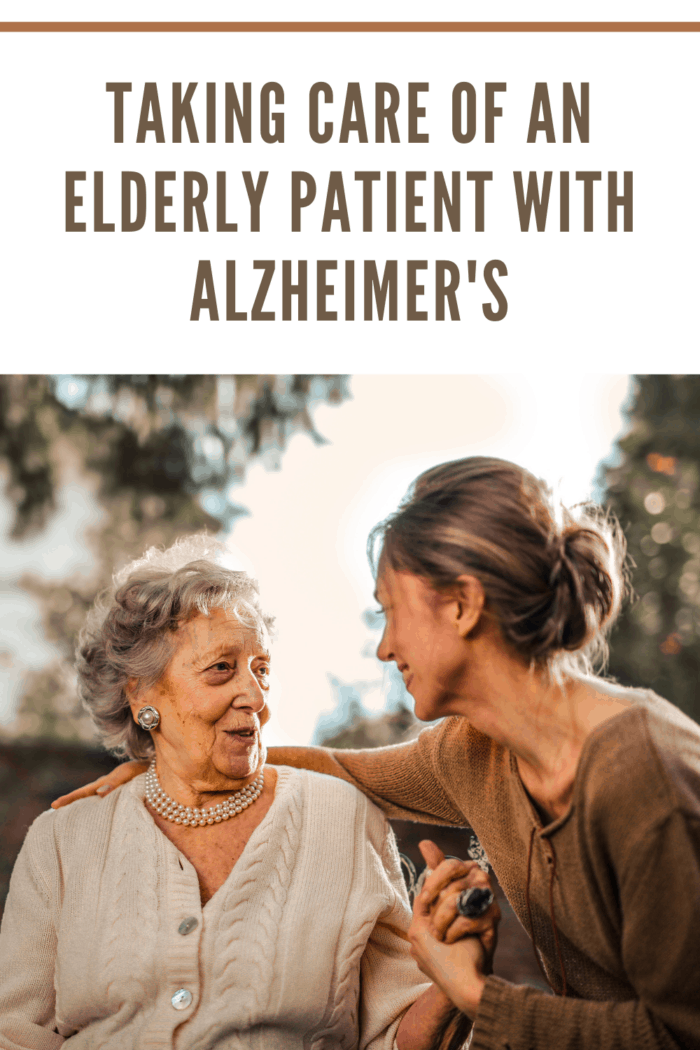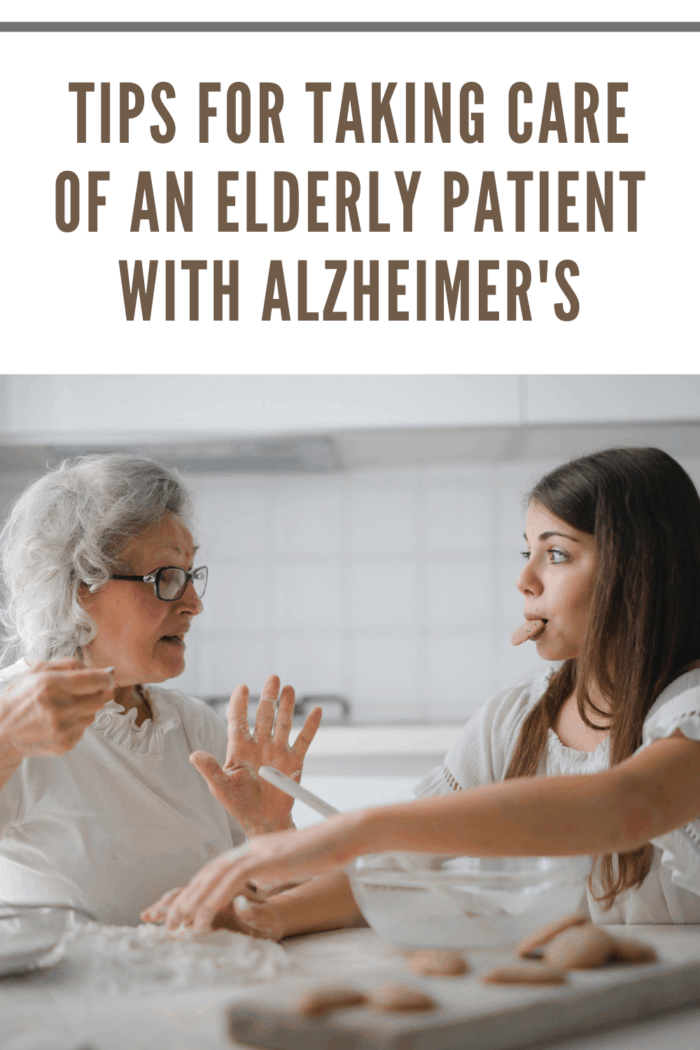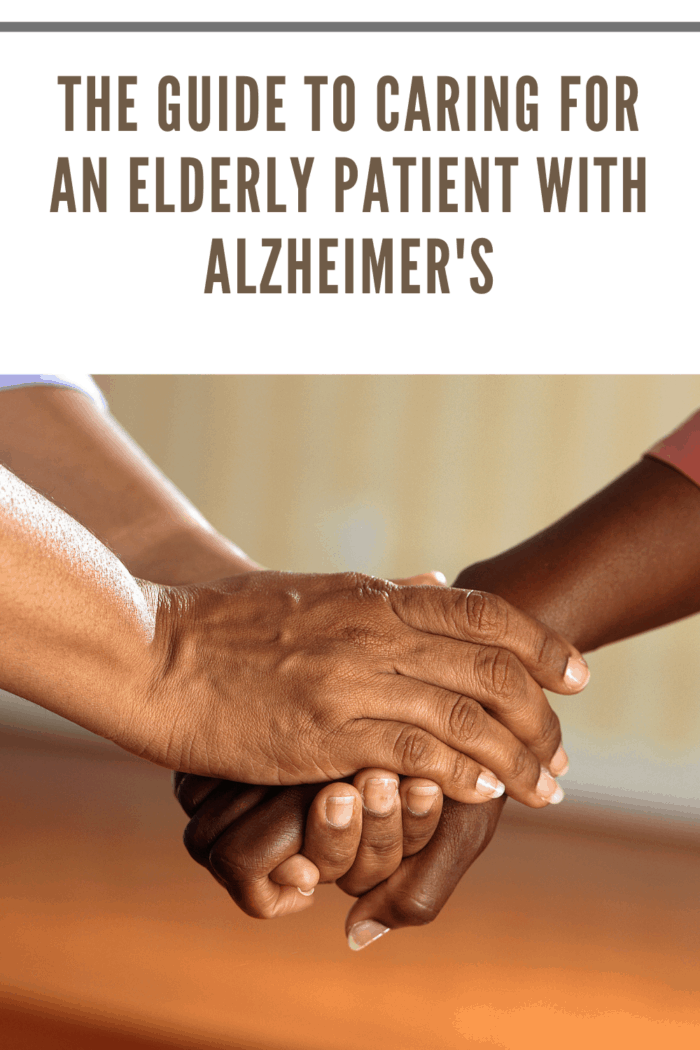Caring for an elderly Alzheimer’s patient is not an easy job.
You have to be constantly vigilant so that they don’t get hurt or harm those around them.
Cognitive therapy and behavioral treatment are some common ways to tackle this ailment in the early stages.
Alzheimer’s is prevalent among the elderly, hampering their memory, cognitive skills, and everyday life.
However, it is not just the patient who suffers from this ailment. This medical condition can take a toll on those close to the patient as well.
In fact, nursing students often create poster presentations and nursing assignments to explain treatment techniques.
These posters contain a lot of infographics, stats, and studies to substantiate the diagnosis.
And while I would recommend that you hire a caretaker, there are some ways you can care for them at home as well.

Read up about Alzheimer’s
Before you begin caring for an Alzheimer’s patient, you should do a bit of homework.
Alzheimer’s is a disease that slowly destroys the neurons and brain cells.
It eventually leads to partial or complete memory loss, loss of motor movements, etc.
This disease comes in various stages- mild, moderate, and severe.
Evidence-based nursing practices help identify the symptoms and eventual treatments that would be suitable for the patient.
EBP practices are often backed by logic and stats. Nurses customize the diagnosis to provide accurate insights into the patient’s physical and psychological health.
The mild stage, or the early stage is when the patient though forgetful, can function independently.
Patients in this stage still retain most of their memories and can interact normally.
The moderate or second stage is a significant sign of memory loss and physical weakness.
The patient won’t remember close family members, have trouble organizing things or completing simple tasks.
In the severe stage, the patient loses all communication and cognitive abilities.
In this stage, you need a caretaker with the patient 24*7 to help them walk, sit, and eat.
Help with everyday grooming
It is heart-breaking to see someone close to you slowly lose their memory and forget even the simplest of tasks.
Sometimes, the patient might not even remember themselves or recognize those around them.
Elderly patients need a lot of help with their everyday activities.
Something as simple as brushing the teeth might be a cumbersome task for most.
In such a scenario, you must keep calm and patiently guide them through these tasks.
Try to maintain a regular routine and go through repetitive tasks with them.
This is a part of cognitive therapy. Take care of their daily hygiene and ensure that they follow the same activities daily; this helps in memory retention.

Keep them engaged
You must keep the patient occupied with mental and physical exercises.
Patients in the early stages of Alzheimer’s might understand your intent and cooperate.
However, for the more severe cases, you would also need some medication and professional help.
I suggest you try some activities like cooking, painting, or simple exercises for starters.
You can even take them out for regular walks, have meditation sessions, etc. to keep them calm.
You can even get simple puzzles for dementia patients to stimulate them mentally.
Ensure physical and mental safety
Safety is one of the biggest concerns people have when caring for an Alzheimer’s patient.
As the patient’s condition deteriorates, it gets more difficult for them to control their physical and mental functions.
Some patients tend to get very anxious, withdrawn, or even aggressive.
Be prepared for violent outbursts, panic attacks, and mental breakdowns.
Remember, you need to support them through it all.
Elderly patients also have physical aches and brittle bones vulnerable to injury.
You can use physiotherapy or laser treatment for pain-relief.
Also, ensure that the patient has no sharp objects within their reach.
Dress the patient in loose clothes and sturdy non-slipper shoes.
For patients in the later stages of Alzheimer’s, you would have to label all the items around the house so that they can recognize and identify things.
Remove the mirrors around the place, install safety locks and home cameras to keep an eye on the patient at all times.
Also, keep the sound and sudden movements to a bare minimum.
Add thick carpeting on the floors, add pads to all the sharp corners around the house and always lock the doors.
It would also be great if you had hospital beds for Alzheimer’s patients for their safety and to meet the family’s caregiving demands.

Communicate regularly
Communication is key when it comes to caring for Alzheimer’s patients.
You need to be there around them and talk to them normally, no matter what.
Always greet them with a smile and maintain eye contact when you talk to them.
Also, keep your body language confident and welcoming.
Don’t keep a dominating stance, be open, warm, and friendly.
Ensure that you are loud enough when talking to them.
Enunciate each word carefully and speak very slowly.
Don’t ask a lot of questions or bombard them with information.
Regular therapy makes it easier for the patient to deal with their anxiety.
Other than that, you can even get them an animal companion.
There are dogs and cats trained to handle mental health patients.
These service animals make great companions and support systems for the patient.
Take care of their nutrition
Nursing professionals often include a detailed diet chart for the patient in their nursing plan.
Aspiring medical students can get the nursing plan templates online or structure one as per their senior’s guidelines.
These plans help keep track of the patient’s physical health and nutrition intake.
Alzheimer’s patients might forget their meals or how to eat.
You have to keep regular alarms, label all the food, and sometimes even feed them.
Include a lot of fruits and veggies in their diet.
Also, ensure that the patient is well hydrated and has a lot of fluid intake throughout the day.
Add multivitamins and iron supplements to boost brain function.
It would be easier to serve them dry, or finger foods cut into bite-sized pieces.
Plate their meals in colorful bowls and ensure that they chew and swallow their food properly.

Don’t lose hope
Last but not least, don’t lose hope.
The patients in the initial stages of Alzheimer’s still have a chance of recovery.
In case the condition is severe, you can at least keep them happy or in a normal state with these care measures.
Do everything you can to keep their morale up.
Alzheimer’s dementia and ailments like these can affect the patient’s self-confidence.
They end up feeling like a burden on those around them.
This triggers extreme depression, anxiety, and even suicidal thoughts.
And as for yourself, remember you don’t have to do everything alone.
Reach out to support groups, medical experts, and professional caretakers when things get overwhelming.
Bonus: Caring for Loved One with Alzheimer’s in the Summer:
Summer is revered for its fun-filled, adventure-seeking nature.
It’s a time when people head outdoors or take on new, fun activities that they may have been waiting for since the cooler months passed.
But, for many battling Alzheimer’s or other dementia-related diseases, summer can be a difficult transition… a time with increased stress and risk.
According to the Alzheimer’s Association, it’s estimated that more than 6 million Americans are living with Alzheimer’s in 2021.
That means that nearly 6 million Americans are battling the daily effects of Alzheimer’s in these hot summer months.
Lisa Skinner, a behavioral expert in the field of Alzheimer’s disease and related dementias and author of the upcoming book Truth, Lies & Alzheimers, highlights the unique effects that hot summertime weather can have on a person battling Alzheimer’s:
“Older adults, and particularly individuals who suffer from Azheimer’s disease and dementia are at a much higher risk during hot weather than their younger counterparts. As we age there are many factors to be aware of. 1) Our bodies are less able to adjust to sudden temperature changes, 2) An elderly individual may have a chronic medical condition that affects their response to heat, and 3) Medications they are taking may not interact well with heat,” says Lisa.
So, why must caregivers and loved ones understand how certain summertime activities may require extra attention for people with Alzheimer’s and dementia?
“Caregivers will need to take extra precautions during the hot summer months if the person they are caring for has Alzheimer’s disease and dementia. Due to their cognitive loss, they will probably not have the sensory ability to take the appropriate measures to protect themselves from intense heat. They may be unaware that they are overheated, dehydrated or getting sunburned. Outdoor activities such as picnics, walks, gardening, fruit picking, or a trip to the zoo present wonderful opportunities for creating special moments of joy for those with dementia; however, even brief exposure to the heat can prove to be extremely dangerous. It does not take long for a senior to suffer from heat exhaustion or heat stroke if they are exposed to the sun for too long.”
Here are Lisa’s top 5 tips to ensure that their loved one with Alzheimer’s can safely engage in activities throughout the summer:
TIP #1: Stay hydrated
Dehydration can occur very quickly during the summer. Make sure you offer water and/or fruit juices on a regular basis and be sure there is plenty of hydration available wherever you go. Encourage them to drink even if they act like they don’t want it. They might not always realize that they are thirsty and/or that they need to drink to stay hydrated. Avoid caffeine, alcohol, and other diuretics.
TIP #2: Be mindful of clothing choices
Make sure they are dressed in weather-appropriate attire. Have them wear loose, breathable clothing to help reduce sweating and help them stay cool. Have them wear a hat and sunglasses, and make sure you apply sunscreen every few hours, to protect any exposed skin.
TIP #3: Keep cool and shaded outdoors
Look for shaded areas as much as possible if doing an outdoor activity. Try to keep the outdoor activity to a minimum during the peak summer hours, between 10 a.m. and 4 p.m. Stay close and look for changes in their behavior and signs of distress. Have an exit strategy in place.
TIP #4: Keep cool and shaded indoors
Use air conditioning or fans to keep their living space comfortable for them, and allow them to get sufficient rest or quiet time to help them deal with the heat.
TIP #5: Exercise
Exercise is important for overall health; however, it should be limited to cool times of the day and cool areas of the home during the summer months.
Author Bio: Mary is an academic expert and editor-in-chief at Top My Grades. She specializes in healthcare and helps students with nursing posters, reports, and papers. Beyond work, she is gardening in her backyard, accompanied by her dogs – Birch & Bailey.
